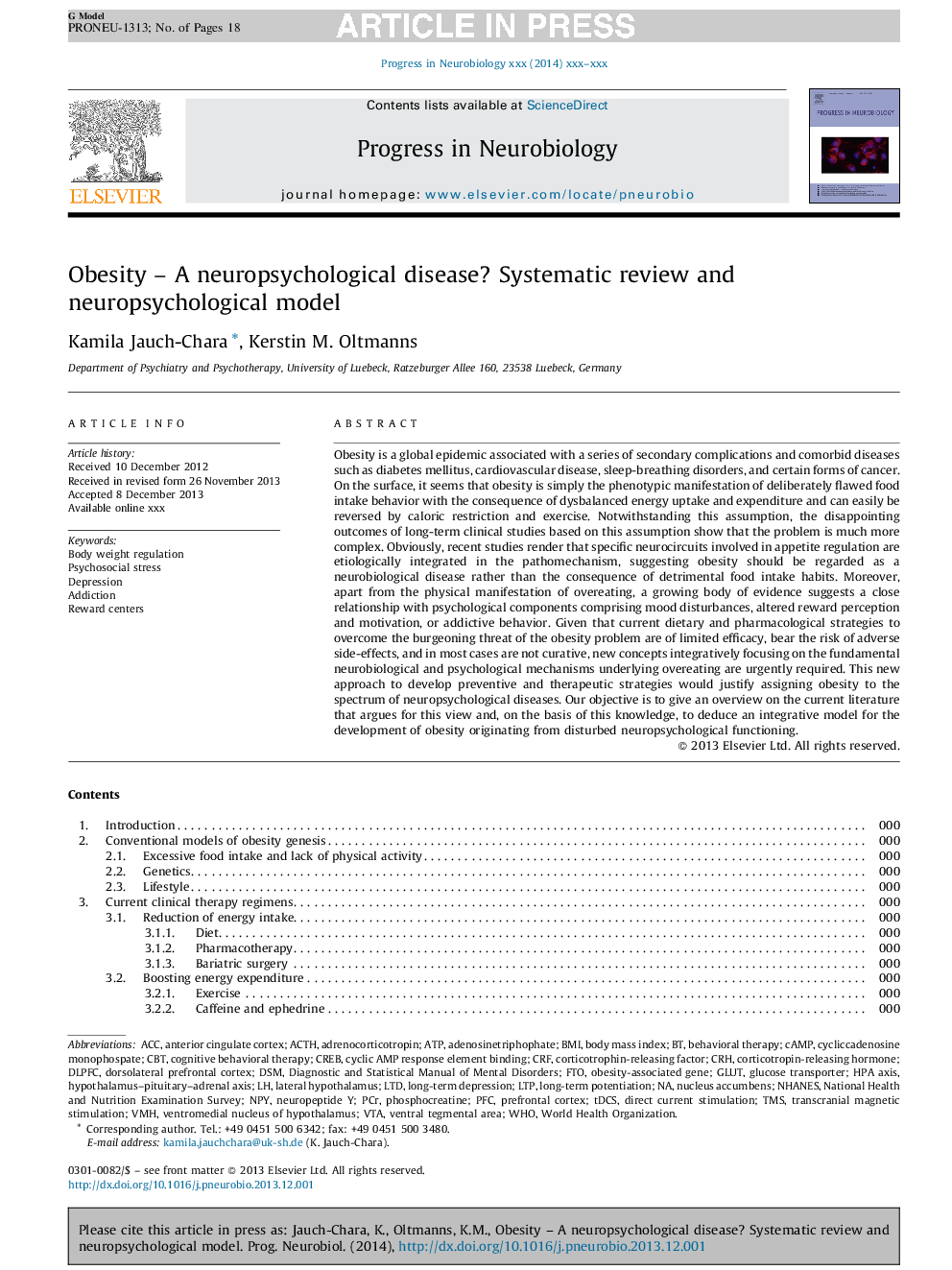| کد مقاله | کد نشریه | سال انتشار | مقاله انگلیسی | نسخه تمام متن |
|---|---|---|---|---|
| 6286536 | 1615395 | 2014 | 18 صفحه PDF | دانلود رایگان |
عنوان انگلیسی مقاله ISI
Obesity - A neuropsychological disease? Systematic review and neuropsychological model
ترجمه فارسی عنوان
چاقی - بیماری نوروپسیکولوژی؟ بررسی سیستماتیک و مدل روانشناختی
دانلود مقاله + سفارش ترجمه
دانلود مقاله ISI انگلیسی
رایگان برای ایرانیان
کلمات کلیدی
CREBVMHGLUTVTADLPFCtDCSVentromedial nucleus of hypothalamusNHANESCRFNPYTMSCRHACCACTHDSMPFCcAMP - cAMPadrenocorticotropin - آدرنوکورتیکوتروپینATP - آدنوزین تری فسفات یا ATPPsychosocial stress - استرس یا فشار روانی اجتماعیAddiction - اعتیاد Depression - افسردگیlong-term depression - افسردگی طولانی مدتNational Health and Nutrition Examination Survey - بررسی بهداشت و تغذیه ملیDirect current stimulation - تحرک جاری مستقیمTranscranial magnetic stimulation - تحریک مغناطیسی مغزlong-term potentiation - تقویت درازمدتLTP - تقویت طولانی مدت یا LTP Body weight regulation - تنظیم وزن بدنGlucose transporter - حمل و نقل گلوکزBehavioral therapy - درمان رفتاریCognitive behavioral therapy - درمان رفتاری شناختیFTO - دعوتDiagnostic and Statistical Manual of Mental Disorders - راهنمای تشخیصی و آماری اختلالهای روانیCBT - رفتار درمانی شناختی World Health Organization - سازمان بهداشت جهانیbody mass index - شاخص توده بدنBMI - شاخص توده بدنیPhosphocreatine - فسفریکراتینprefrontal cortex - قشر prefrontalanterior cingulate cortex - قشر سینگولیت قدامی، کورتکس سینگولیت قدامیdorsolateral prefrontal cortex - قشر پیشانی غدد درون رحمیLTD - محدودhypothalamus–pituitary–adrenal axis - محور هیپوتالاموس هیپوفیز-آدرنالHPA axis - محور هیپوتالاموس-هیپوفیز-آدرنالventral tegmental area - ناحیه تگمنتوم شکمیNucleus accumbens - هسته accumbenscorticotropin-releasing hormone - هورمون آزاد کننده کورتیکوتروپینlateral hypothalamus - هیپوتالاموس جانبیPCR - واکنش زنجیرهٔ پلیمرازWHO - کهcorticotrophin-releasing factor - کورتیکوتروپین آزاد کننده فاکتورNeuropeptide Y - یوروپروتئین Y
ترجمه چکیده
چاقی یک اپیدمی جهانی است که همراه با یک سری عوارض ثانویه و بیماری های مرتبط با بیماری مانند دیابت، بیماری های قلبی عروقی، اختلالات تنفسی خواب و انواع خاصی از سرطان است. بر روی سطح، به نظر می رسد چاقی به سادگی نشانۀ فنوتیپی رفتار عمدی مصرف نادرست غذا با نتیجه مصرف انرژی و عدم مصرف انرژی است و به راحتی می تواند با محدودیت کالری و تمرینات معکوس شود. با وجود این فرض، نتایج ناامید کننده مطالعات بالینی طولانی مدت بر اساس این فرض نشان می دهد که مشکل بسیار پیچیده است. بدیهی است، مطالعات اخیر نشان می دهد که نوروپروتئین های خاصی که در تنظیم اشتها دخیل هستند، از لحاظ اخلاقی در پاتوژنیک یکپارچه شده اند، و این نشان می دهد که چاقی باید به عنوان یک بیماری عصبی شناختی به جای عادت مصرف غذای مضر در نظر گرفته شود. علاوه بر این، به غیر از تجلی فیزیکی فراوانی، یک شواهد رو به رشد از شواهد نشان می دهد که ارتباط نزدیک با اجزای روانشناختی شامل اختلالات خلقی، ادراک پاداش و انگیزه یا رفتار اعتیاد آور است. با توجه به اینکه راهکارهای جاری و دارویی فعلی برای غلبه بر تهدید رو به رشد چاقی از اثربخشی محدود است، خطر عوارض جانبی نامطلوب را در بر می گیرند و در اغلب موارد درمانی نیستند، مفاهیم جدید با یکپارچگی بر روی سازوکارهای بیرونیولوژی و روانشناختی اساسی پرخوری ضروری است. این رویکرد جدید برای توسعه استراتژی های پیشگیرانه و درمانی، تخصیص چاقی برای طیف بیماری های عصبی روحی را توجیه می کند. هدف ما این است که خلاصه ای از ادبیات فعلی که برای این دیدگاه استدلال می کنیم و بر اساس این دانش، یک مدل یکپارچه برای توسعه چاقی ناشی از اختلالات عملکرد روانی-روان شناختی را بیاموزیم.
موضوعات مرتبط
علوم زیستی و بیوفناوری
علم عصب شناسی
علوم اعصاب (عمومی)
چکیده انگلیسی
Obesity is a global epidemic associated with a series of secondary complications and comorbid diseases such as diabetes mellitus, cardiovascular disease, sleep-breathing disorders, and certain forms of cancer. On the surface, it seems that obesity is simply the phenotypic manifestation of deliberately flawed food intake behavior with the consequence of dysbalanced energy uptake and expenditure and can easily be reversed by caloric restriction and exercise. Notwithstanding this assumption, the disappointing outcomes of long-term clinical studies based on this assumption show that the problem is much more complex. Obviously, recent studies render that specific neurocircuits involved in appetite regulation are etiologically integrated in the pathomechanism, suggesting obesity should be regarded as a neurobiological disease rather than the consequence of detrimental food intake habits. Moreover, apart from the physical manifestation of overeating, a growing body of evidence suggests a close relationship with psychological components comprising mood disturbances, altered reward perception and motivation, or addictive behavior. Given that current dietary and pharmacological strategies to overcome the burgeoning threat of the obesity problem are of limited efficacy, bear the risk of adverse side-effects, and in most cases are not curative, new concepts integratively focusing on the fundamental neurobiological and psychological mechanisms underlying overeating are urgently required. This new approach to develop preventive and therapeutic strategies would justify assigning obesity to the spectrum of neuropsychological diseases. Our objective is to give an overview on the current literature that argues for this view and, on the basis of this knowledge, to deduce an integrative model for the development of obesity originating from disturbed neuropsychological functioning.
ناشر
Database: Elsevier - ScienceDirect (ساینس دایرکت)
Journal: Progress in Neurobiology - Volume 114, March 2014, Pages 84-101
Journal: Progress in Neurobiology - Volume 114, March 2014, Pages 84-101
نویسندگان
Kamila Jauch-Chara, Kerstin M. Oltmanns,
